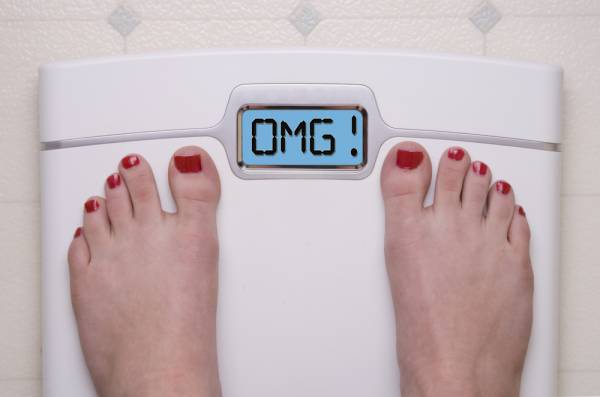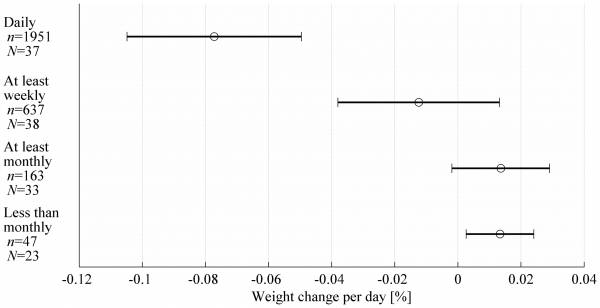Many fitness and nutriton professionals warn against weighing yourself frequently. However, the practice might have some benefits after all, according to a recent PLOS ONE study.
What the research says:
- Daily weigh-ins significantly increased weight loss in overweight subjects.
- Less frequent weighing was correlated with lower weight loss or even weight gain.
![]()

Background
As the old saying goes, “Knowledge is power.” As noted by the researchers of the study, frequent self-monitoring of one’s bodyweight has been associated with favorable outcomes for weight loss plans in previous studies. Frequent weigh-ins have been even more successful for weight maintenance.
Since many athletes struggle with their weight, it’s possible that a greater access to data could provide more consistent feedback. The feedback would have two potential effects:
- It would provide information about the strategy for weight maintenance, loss, or possibly even gain.
- It would provide an extra level of accountability.
The researchers also noted that, in theory, frequent self-weighing improves self-awareness and provides an early detection system. Much of the past literature has relied on self-reporting and isn’t particularly precise.
In this study, the researchers wanted to know if regular weigh-ins do help, and, if so, what would be the best frequency. They were also interested in how natural fluctuations in weigh-in frequency affected body weight.
RELATED: 7 Reasons You Aren’t Losing Weight (Or Keeping It Off)
Study Design
A group of 117 participants were asked what their goals were for their body weight. Forty participants indicated they would like to lose weight. They received a scale and were provided with an app to record their weigh-in data. They were encouraged to weigh themselves just after waking up, but prior to breakfast. The subjects did this over the course of a year.
RELATED: 10 Signs Your Scale Is Telling Lies
Results
The frequency of weigh-ins was inversely associated with weight loss. As the researchers noted, “Weight loss was significantly decelerated or weight increased when the day difference between two consecutive weight measurements became longer.”
“The risk of weight gain from insufficient self-awareness and lack of feedback increased in subjects who measured less frequently.”
When the goal was weight loss, the best frequency for weighing was daily. The researchers found subjects who weighed in less than once a week actually experienced weight gain. They hypothesized that the risk of weight gain increased due to insufficient self-awareness and lack of feedback.
By contrast, daily weighing was associated with weight loss. The average weight loss associated with daily weigh-ins was nearly 0.8% of bodyweight per day. For a 200lb person, that means a weight loss of about 1.5lb, which is pretty substantial. In contrast, subjects who only weighed themselves weekly lost about .25lb per day, as shown in the graph below.

Figure 3: Mean weight change per day (circle) and the 95% confidence intervals (horizontal lines) in different self-weighing categories.
Conclusions
Daily weighing may support an obsessive behavior at a level that is psychologically unhealthy. However, the practice of daily weighing seems to be beneficial for those who tend to be overweight. As long as it doesn’t become obsessive, daily weight monitoring is beneficial for weight loss.
References:
1. Elina Helander, et. al., “Are Breaks in Daily Self-Weighing Associated with Weight Gain?,” PLoS ONE 2014, 9(11)
Photo courtesy of Shutterstock.






